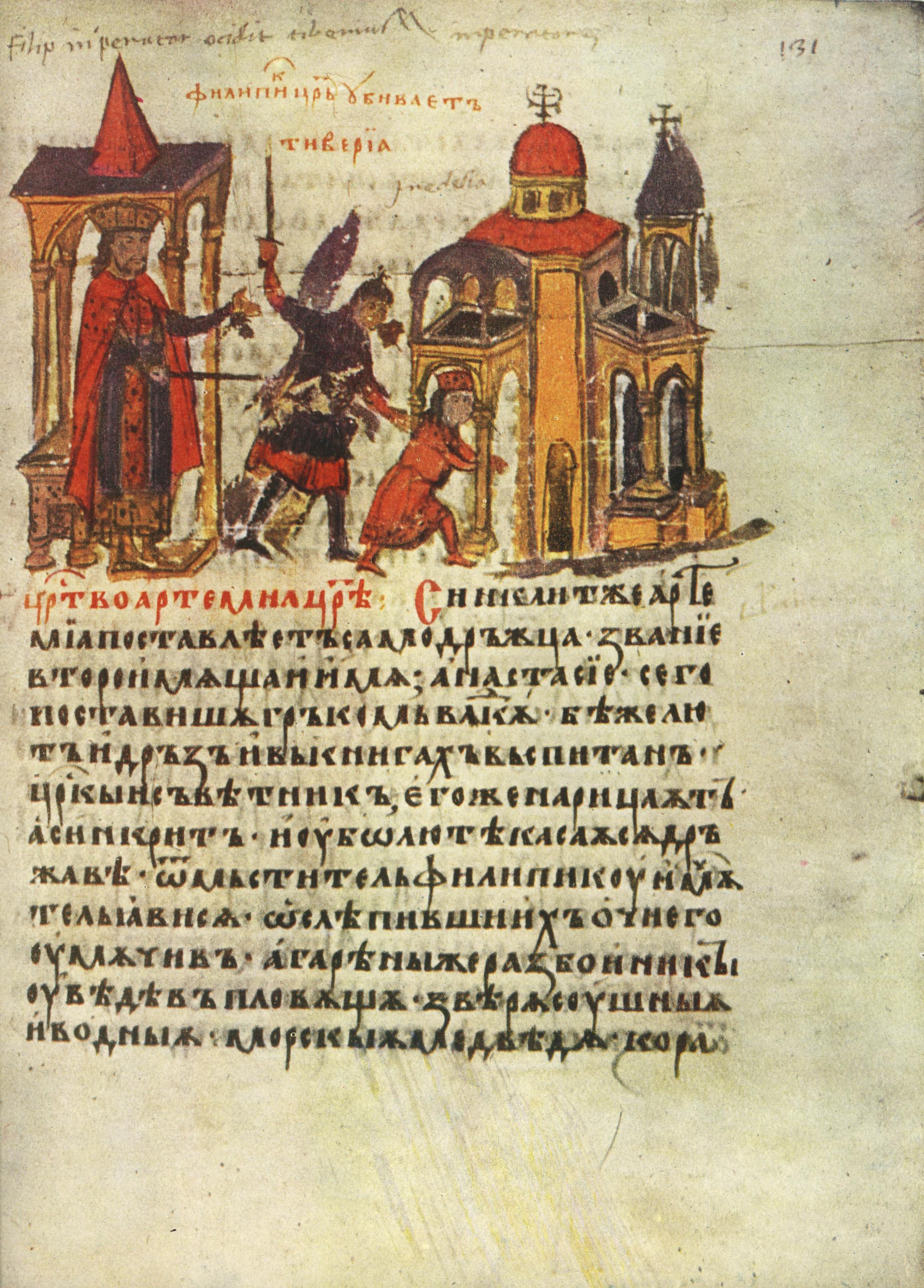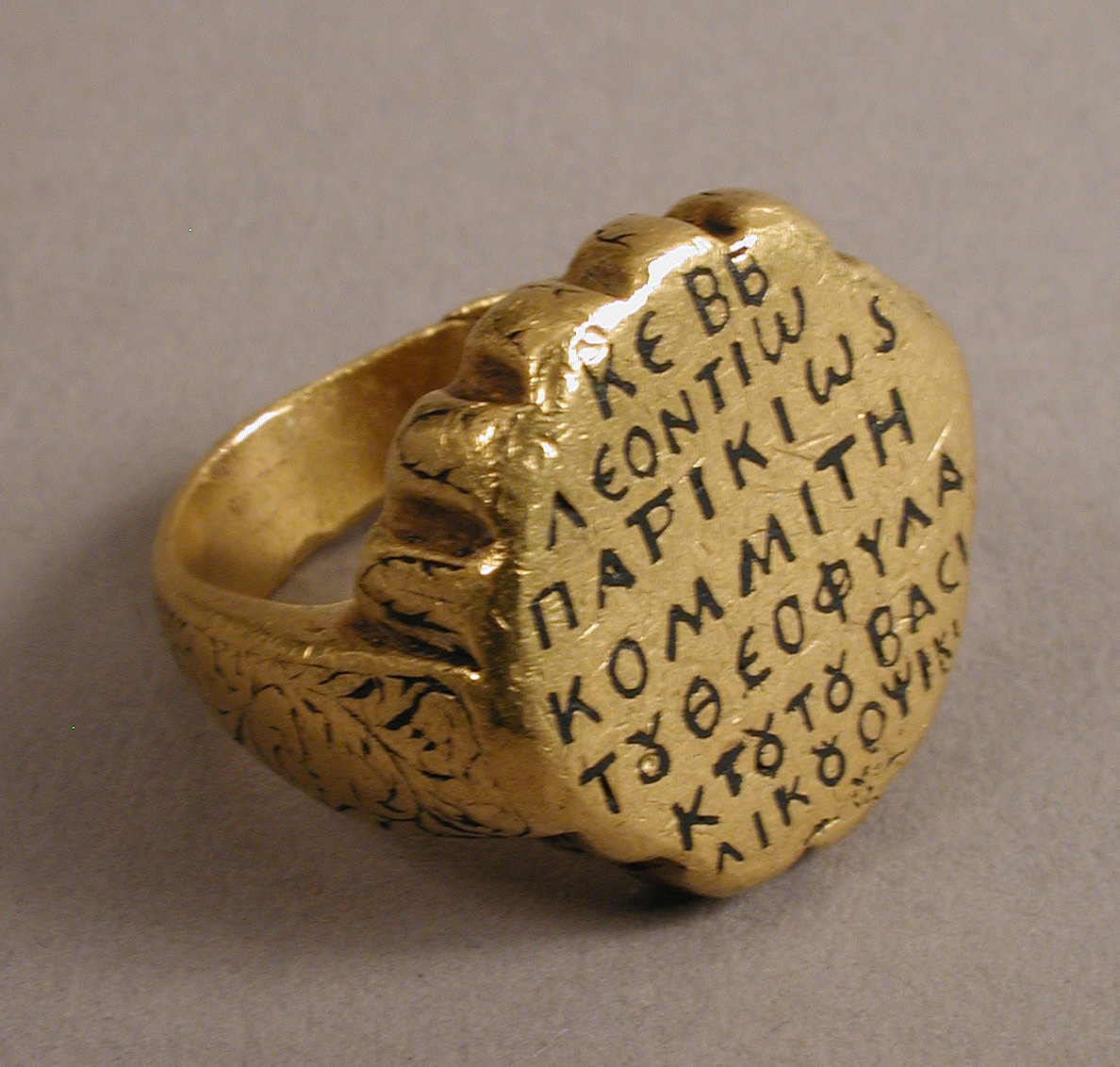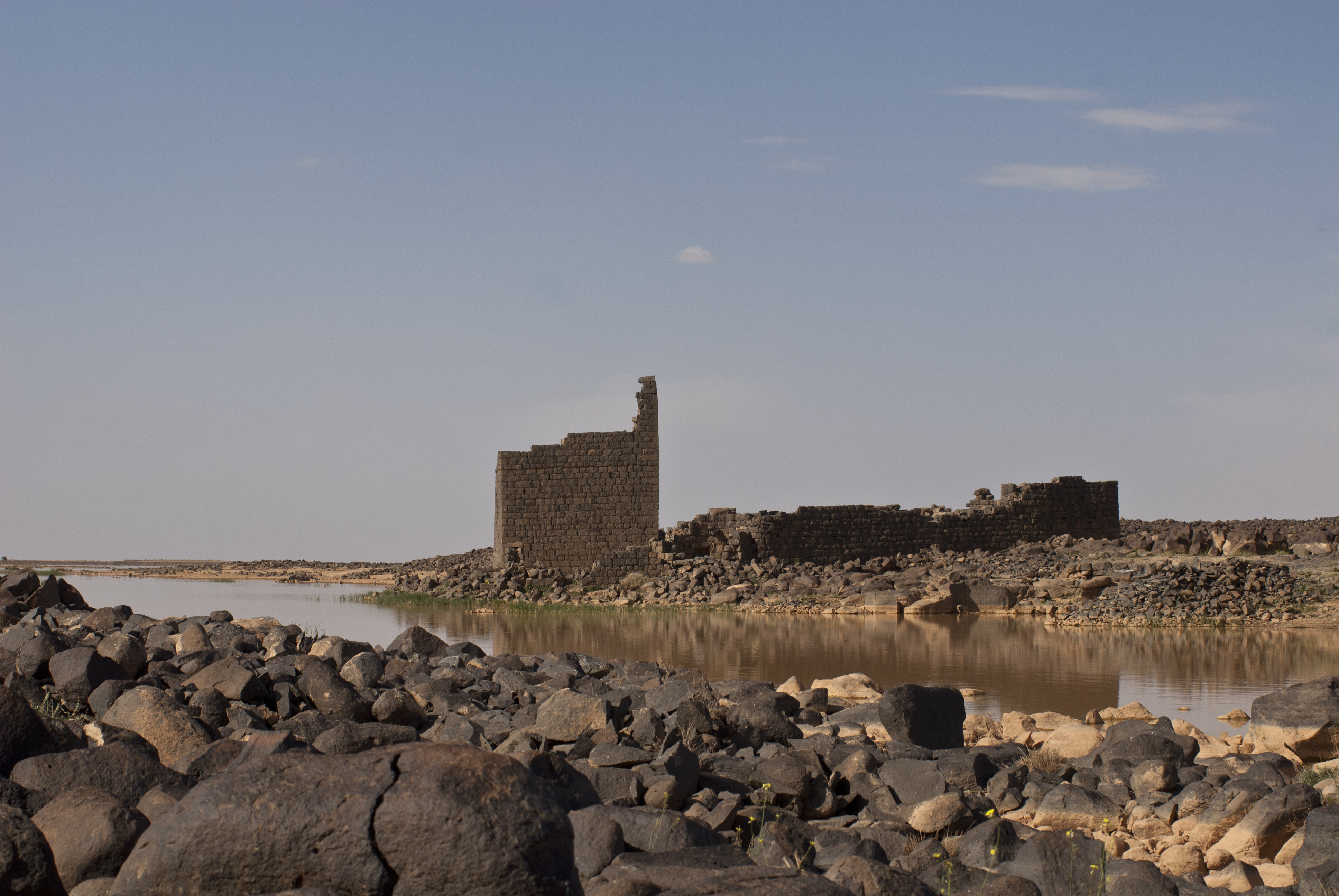|
713
__NOTOC__ Year 713 ( DCCXIII) was a common year starting on Sunday of the Julian calendar, the 713th year of the Common Era (CE) and Anno Domini (AD) designations, the 713th year of the 1st millennium, the 13th year of the 8th century, and the 4th year of the 710s decade. The denomination 713 for this year has been used since the early medieval period, when the Anno Domini calendar era became the prevalent method in Europe for naming years. Events By place Byzantine Empire * June 3 – Emperor Philippicus is blinded, deposed, and sent into exile by conspirators of the Opsikion army in Thrace, after a reign of 1 year and 6 months. He is succeeded by Anastasios II, a bureaucrat and imperial secretary, who restores internal order and begins the reorganization of the Byzantine army. He executes the officers who have been directly involved in the conspiracy against Philippicus. * Arab–Byzantine wars: The Umayyad Arabs under al-Abbas ibn al-Walid, son of caliph al- ... [...More Info...] [...Related Items...] OR: [Wikipedia] [Google] [Baidu] |
Anastasios II
Anastasius II (; died 719), born Artemius (, was the Byzantine emperor from 713 to 715. His reign was marked by significant religious and political decisions aimed at stabilizing the Empire. One of his notable actions was reversing the previous appointment of a Monothelete patriarch of Constantinople, instead reinstating Orthodoxy by appointing Germanus I to the position. This move was made in an effort to gain the favor of Pope Constantine. Anastasius II dedicated his efforts to fortifying the Empire and fostering a period of stability. However, his reign was cut short when he was deposed by Theodosius III during the Byzantine campaign against the Umayyad Caliphate in 715. Undeterred, four years later, in 719, Anastasius launched a rebellion against Leo III the Isaurian in a bid to reclaim the imperial throne. Initially, Anastasius received support from Tervel of Bulgaria, who provided soldiers and funds for his cause. However, the situation took a turn when Anastasius faile ... [...More Info...] [...Related Items...] OR: [Wikipedia] [Google] [Baidu] |
Philippikos Bardanes
Philippicus (; ), born Bardanes (; ) was Byzantine emperor from 711 to 713. He took power in a coup against the unpopular emperor Justinian II, and was deposed in a similarly violent manner nineteen months later. During his brief reign, Philippicus supported monothelitism in Byzantine theological disputes, and saw conflict with the First Bulgarian Empire and the Umayyad Caliphate. Biography Philippicus was originally named Bardanes (; ); he was the son of the patrician Nicephorus, who was of Armenian extraction from an Armenian colony in Pergamum. The Armenian background of Philippicus has been supported by Byzantinist historians Peter Charanis and Nicholas Adontz, and disputed by Anthony Kaldellis. Kaldellis adds that Bardanes was probably born and raised in the Byzantine realm, as his father Nicephorus possibly was. Contemporaneous sources attest to Bardanes' tutoring, scholarly interests, learning and eloquence, all of which were in Greek. Byzantine historians Leslie B ... [...More Info...] [...Related Items...] OR: [Wikipedia] [Google] [Baidu] |
Ealdwulf Of East Anglia
Ealdwulf (), also known as Aldulf or Adulf, was king of East Anglia from 664 to 713. He was the son of Hereswitha, a Northumbrian princess, and of Æthilric (d. before 664), whose brothers all ruled East Anglia during the 7th century. Ealdwulf recalled that when he was very young, he saw the Christian/pagan temple belonging to his ancestor Rædwald. Few details are known of Ealdwulf's long reign of 49 years; its length reflects the success of alliances formed in the decades before his ascension. During his period as king, East Anglia experienced stability and growth, not least in its commercial centre at Gipeswic (now modern Ipswich), and an East Anglian coinage appeared for the first time. Within his kingdom, the diocese of the East Angles was divided, with a new seat at Helham (probably at North Elmham in Norfolk). He and his otherwise unknown queen produced at least two children. He was succeeded in 713 by their son Ælfwald, the last of the Wuffingas dynasty to rule th ... [...More Info...] [...Related Items...] OR: [Wikipedia] [Google] [Baidu] |
Arab People
Arabs (, , ; , , ) are an ethnic group mainly inhabiting the Arab world in West Asia and North Africa. A significant Arab diaspora is present in various parts of the world. Arabs have been in the Fertile Crescent for thousands of years. In the 9th century BCE, the Assyrians made written references to Arabs as inhabitants of the Levant, Mesopotamia, and Arabia. Throughout the Ancient Near East, Arabs established influential civilizations starting from 3000 BCE onwards, such as Dilmun, Gerrha, and Magan (civilization), Magan, playing a vital role in trade between Mesopotamia, and the History of the Mediterranean region, Mediterranean. Other prominent tribes include Midian, ʿĀd, and Thamud mentioned in the Hebrew Bible, Bible and Quran. Later, in 900 BCE, the Qedarites enjoyed close relations with the nearby Canaan#Canaanites, Canaanite and Aramaeans, Aramaean states, and their territory extended from Lower Egypt to the Southern Levant. From 1200 BCE to 110 BCE, powerful ... [...More Info...] [...Related Items...] OR: [Wikipedia] [Google] [Baidu] |
Ælfwald Of East Anglia
Ælfwald (Old English: ''Alfƿold'', "elf-ruler," reigned from 713 to 749) was an 8th-century king of Kingdom of East Anglia, East Anglia, an Anglo-Saxon kingdom that today includes the English counties of Norfolk and Suffolk. The last king of the Wuffingas dynasty, Ælfwald succeeded his father Ealdwulf of East Anglia, Ealdwulf, who had ruled for 49 years. Ælfwald himself ruled for 36 years. Their combined reigns, with barely any record of external military action or internal dynastic strife, represent a long period of peaceful stability for the East Angles. In Ælfwald's time, this was probably owing to a number of factors, including the settled nature of East Anglian ecclesiastical affairs and the prosperity brought through Rhineland commerce with the East Anglian port of Gipeswic (modern Ipswich). The coinage of Anglo-Saxon sceattas expanded in Ælfwald's time: evidence of East Anglian mints, markets, and industry are suggested where concentrations of such coins have been di ... [...More Info...] [...Related Items...] OR: [Wikipedia] [Google] [Baidu] |
Turkey
Turkey, officially the Republic of Türkiye, is a country mainly located in Anatolia in West Asia, with a relatively small part called East Thrace in Southeast Europe. It borders the Black Sea to the north; Georgia (country), Georgia, Armenia, Azerbaijan, and Iran to the east; Iraq, Syria, and the Mediterranean Sea to the south; and the Aegean Sea, Greece, and Bulgaria to the west. Turkey is home to over 85 million people; most are ethnic Turkish people, Turks, while ethnic Kurds in Turkey, Kurds are the Minorities in Turkey, largest ethnic minority. Officially Secularism in Turkey, a secular state, Turkey has Islam in Turkey, a Muslim-majority population. Ankara is Turkey's capital and second-largest city. Istanbul is its largest city and economic center. Other major cities include İzmir, Bursa, and Antalya. First inhabited by modern humans during the Late Paleolithic, present-day Turkey was home to List of ancient peoples of Anatolia, various ancient peoples. The Hattians ... [...More Info...] [...Related Items...] OR: [Wikipedia] [Google] [Baidu] |
Political Mutilation In Byzantine Culture
Mutilation was a common method of punishment for criminals in the Byzantine Empire, but it also had a role in the empire's political life. By blinding a rival, one would not only restrict his mobility but also make it almost impossible for him to lead an army into battle, then an important part of taking control of the empire. Castration was also used to eliminate potential opponents. In the Byzantine Empire, for a man to be castrated meant that he was no longer a man—half-dead, "life that was half death". Castration also eliminated any chance of heirs being born to threaten either the emperor's or the emperor's children's place at the throne. Other mutilations were the severing of the nose ( rhinotomy), or the amputating of limbs. Rationale The mutilation of political rivals by the emperor was deemed an effective way of side-lining from the line of succession a person who was seen as a threat. Castrated men were not seen as a threat, as no matter how much power they gained t ... [...More Info...] [...Related Items...] OR: [Wikipedia] [Google] [Baidu] |
Opsikion
The Opsician Theme (, ''thema Opsikiou'') or simply Opsikion (Greek: , from ) was a Byzantine theme (a military-civilian province) located in northwestern Asia Minor (modern Turkey). Created from the imperial retinue army, the ''Opsikion'' was the largest and most prestigious of the early themes, being located closest to Constantinople. Involved in several revolts in the 8th century, it was split in three after ca. 750, and lost its former pre-eminence. It survived as a middle-tier theme until after the Fourth Crusade. History The Opsician theme was one of the first four themes, and has its origin in the praesential armies of the East Roman army. The term ''Opsikion'' derives from the Latin term ''Obsequium'' ("retinue"), which by the early 7th century came to refer to the units escorting the emperor on campaign. It is possible that at an early stage, the ''Opsikion'' was garrisoned inside Constantinople itself. In the 640s, however, following the disastrous defeats suffered dur ... [...More Info...] [...Related Items...] OR: [Wikipedia] [Google] [Baidu] |
8th Century
The 8th century is the period from 701 (represented by the Roman numerals DCCI) through 800 (DCCC) in accordance with the Julian Calendar. In the historiography of Europe the phrase the long 8th century is sometimes used to refer to the period of circa AD 660–820. The coast of North Africa and the Iberian Peninsula quickly came under Islamic Arab domination. The westward expansion of the Umayyad Empire was famously halted at the siege of Constantinople by the Byzantine Empire and the Battle of Tours by the Franks. The tide of Arab conquest came to an end in the middle of the 8th century.Roberts, J., '' History of the World'', Penguin, 1994. In Europe, late in the century, the Vikings, seafaring peoples from Scandinavia, begin raiding the coasts of Europe and the Mediterranean, and go on to found several important kingdoms. In Asia, the Pala Empire is founded in Bengal. The Tang dynasty reaches its pinnacle under Chinese Emperor Xuanzong. The Nara period begins in ... [...More Info...] [...Related Items...] OR: [Wikipedia] [Google] [Baidu] |
Al-Walid I
Al-Walid ibn Abd al-Malik ibn Marwan (; – 23 February 715), commonly known as al-Walid I (), was the sixth Umayyad caliph, ruling from October 705 until his death in 715. He was the eldest son of his predecessor, Caliph Abd al-Malik (). As a prince, he led annual raids against the Byzantines from 695 to 698 and built or restored fortifications along the Syrian Desert route to Mecca. He became heir apparent in , after the death of the designated successor, Abd al-Malik's brother Abd al-Aziz ibn Marwan. Under al-Walid, his father's efforts to centralize government, impose a more Arabic and Islamic character on the state, and expand its borders were continued. He heavily depended on al-Hajjaj ibn Yusuf, his father's powerful viceroy over the eastern half of the caliphate. During his reign, armies commissioned by al-Hajjaj conquered Sind and Transoxiana in the east, while the troops of Musa ibn Nusayr, the governor of Ifriqiya, conquered the Maghreb and Hispania in the w ... [...More Info...] [...Related Items...] OR: [Wikipedia] [Google] [Baidu] |
June 3
Events Pre-1600 * 350 – The Roman usurper Nepotianus, of the Constantinian dynasty, proclaims himself Roman emperor, entering Rome at the head of a group of gladiators. * 713 – The Byzantine Empire, Byzantine emperor Philippikos Bardanes, Philippicus is Political mutilation in Byzantine culture, blinded, deposed and sent into exile by conspirators of the Opsikion army in Thrace. He is succeeded by Anastasios II, who begins the reorganization of the Byzantine army. *1098 – After a five-month siege during the First Crusade, the Crusaders seize Antioch. *1140 – The French scholar Peter Abelard is found guilty of Heresy in Christianity, heresy. *1326 – The Treaty of Novgorod (1326), Treaty of Novgorod delineates borders between Russia and Norway in Finnmark. *1539 – Hernando de Soto claims Florida for Spain. 1601–1900 *1602 – An English naval force defeats a fleet of Spanish galleys, and captures a large Portuguese carrack at the Battle ... [...More Info...] [...Related Items...] OR: [Wikipedia] [Google] [Baidu] |
Julian Calendar
The Julian calendar is a solar calendar of 365 days in every year with an additional leap day every fourth year (without exception). The Julian calendar is still used as a religious calendar in parts of the Eastern Orthodox Church and in parts of Oriental Orthodox Churches, Oriental Orthodoxy as well as by the Amazigh, Amazigh people (also known as the Berbers). The Julian calendar was proposed in 46 BC by (and takes its name from) Julius Caesar, as a reform of the earlier Roman calendar, which was largely a lunisolar calendar, lunisolar one. It took effect on , by his edict. Caesar's calendar became the predominant calendar in the Roman Empire and subsequently most of the Western world for more than 1,600 years, until 1582 when Pope Gregory XIII promulgated a revised calendar. Ancient Romans typically designated years by the names of ruling consuls; the ''Anno Domini'' system of numbering years was not devised until 525, and became widespread in Europe in the eighth cent ... [...More Info...] [...Related Items...] OR: [Wikipedia] [Google] [Baidu] |







